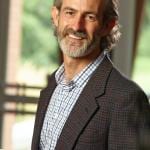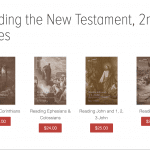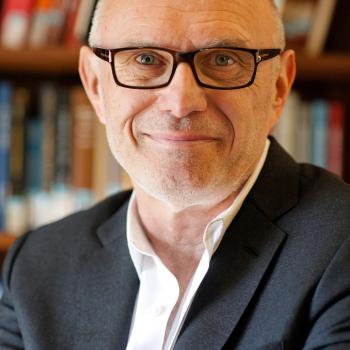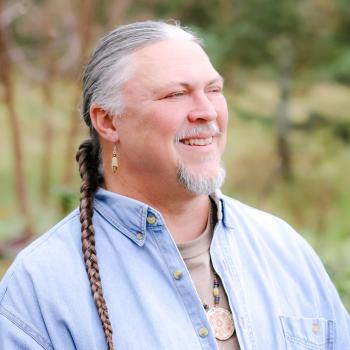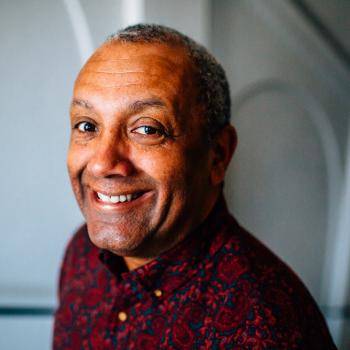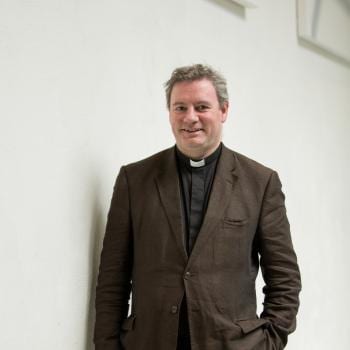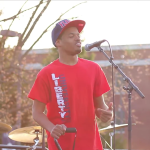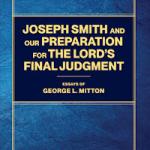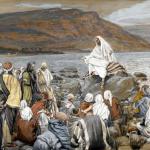
Professor Tom Greggs, FRSE, Marischal Chair (1616) and Head of Divinity at the University of Aberdeen
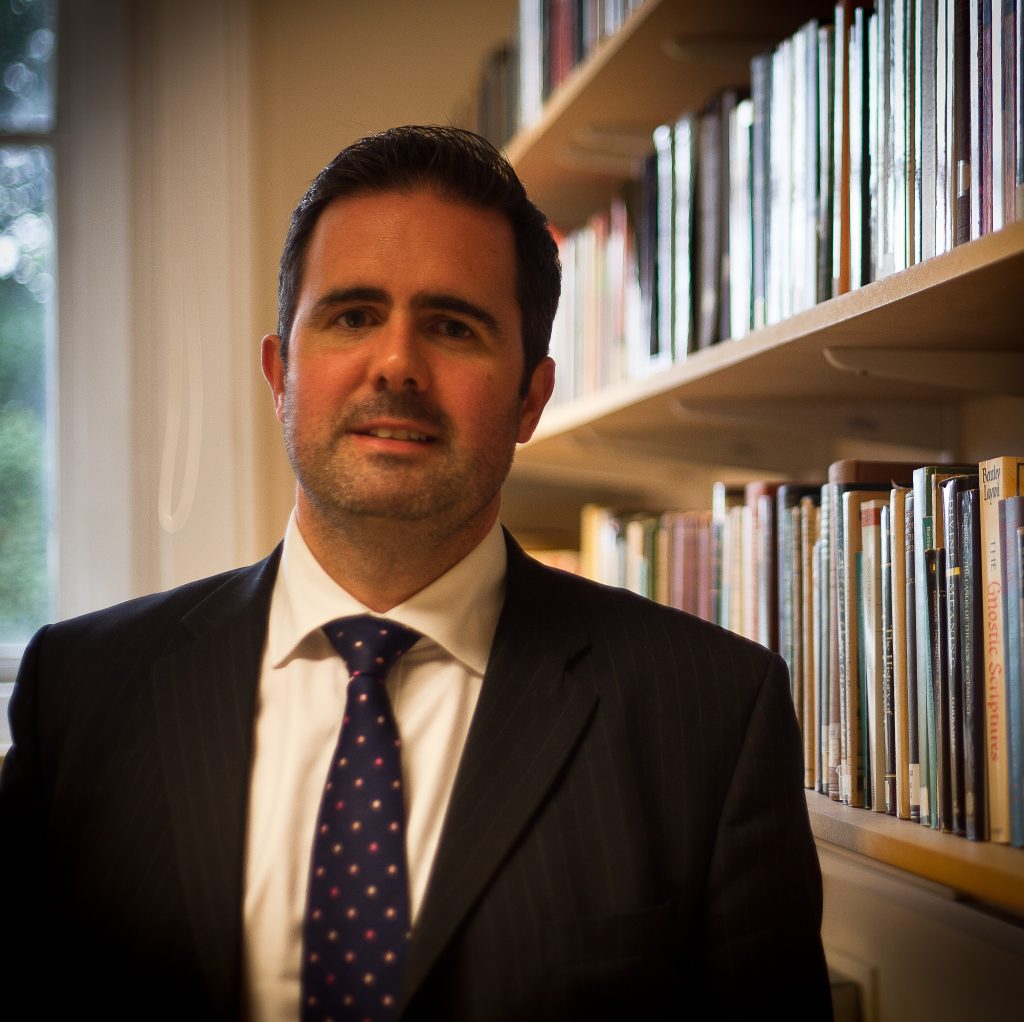
Why do you love teaching and researching about Christian theology?
Teaching and researching Theology is my vocation, and an outworking of the call to preach which I have felt since my teenage years. We are called to love God with our minds in Scripture, amongst all the other ways in which we are to love God. Research in Theology is for me an exercise in attempting to love God in that way with our minds—learning about, reflecting on and dialoguing with the Christian faith as it has been received across the centuries. I feel passionately committed to making Theology count for the church and the society at large within which the church exists. I love thinking about what it means for us to articulate the Gospel in a coherent manner in a post-Christendom world.
For me, the capacity to teach future generations of theologians, pastors, educators and citizens is a tremendous privilege. I love to try to inspire others with my love of Systematic Theology and of its significance for understanding the church and the Christian faith today. My favourite times in the week are seminars and classes with students. I find I learn immense amount from them and their challenges to me—particularly from my grad students. They remind me that all the groundwork we engage in as Theologians has to count on the ground.
What is one “big idea” in your scholarship?
I think I am increasingly aware, as someone who identifies as an evangelical, that love of God and love of neighbour are proportionate to each other, and we shouldn’t in the church engage in a zero sum game pitting one over and against the over. The God we love and to whom we are orientated in prayer, praise and discipleship is the God and Father of all creation who loved the world enough to send the Son and the Spirit for its reconciliation and redemption. And the world which we are to love, witness to, pray for and serve, is the world which is loved of the God and Father who created it and sent the Son and Spirit for its reconciliation and redemption.
In this way, salvation does not only involve God’s activity of putting us right with Godself on the cross, but also of God putting us right with one another in Jesus Christ by the Spirit. And this work which is completed once and for all in Jesus Christ through His life, death and resurrection is actualised in the life of the church in the world by the Spirit in every time and place. If we focus, therefore, on God without focusing on our neighbour, the ‘god’ on whom we are focusing is an idol and not the Father of Jesus Christ and the God of creation, reconciliation and redemption who sends the Son out of the plenitude of God’s grace. If we focus on the neighbour and the world without focusing on God, we have made creation into something other than that which is beloved of God and which God desires to reconcile and redeem through the sending of the Son and the Spirit.
Who is one of your academic heroes and why do you admire them?
It is difficult, given the field of research I have worked in, not to cite Dietrich Bonhoeffer as my hero. Not only is his Theology captivating and not only is it both orthodox and modern (which I admire), but he was also a great martyr of the church who had to make his Theology and his commitment to the Gospel count in what was perhaps the most difficult context the world has seen. His discipleship involved being a deep theologian, but more importantly his Theology and discipleship involved his deep involvement to the world (as Christ’s!) even though that ultimately involved his execution. If, however, we are talking about academics more recently who have influenced me, then John Webster (who was my teacher at Oxford and my colleague at Aberdeen) and David Ford (who supervised by doctorate in Cambridge) are my greatest influences–from very different theological perspectives–and are those I most admire: John taught me rigour and deep engagement with doctrine, dogma, systematics and tradition in the coherent and rational explication of the Gospel; David taught me that theologians have a vocation to both the church and the world, and helped me to formulate my theology in the complexly secular and religious contexts in which I (and most of us) live.
What books were formative for you when you were a student? Why were they so important and shaping?
Discipleship by Dietrich Bonhoeffer: This helped me to understand the vocation of the theologian and why Theology mattered. It kept me on track while I was a student as a Christian as well as challenging me to think as a theologian–especially about grace.
Church Dogmatics I/2 by Karl Barth: This is almost a systematics in its own right. The paragraph (Barth’s term of a section) on the destruction of religion in Jesus Christ captivated me from the age of 16 onwards, and continues to form me.
Church Dogmatics 2/2 by Karl Barth: I was blown away (as an evangelical Methodist!) by this book when I read it as an undergraduate. Every time I have read it since I have seen new things. I think it is the most important and radical book in the last half a millennium, and we are continuing to try to understand it. I’m in good company as well with it: it has been very influential for several theologians I admire–including T. F. Torrance, Jüngel and McCormack.
Read Greggs’s Work
Dogmatic Ecclesiology vol. 1: The Priestly Catholicity of the Church (Baker)
The Breadth of Salvation (Baker)
Is Greggs on Social Media?
No! I should be. I’m going to start being on Twitter soon; I need to! But Divinity at Aberdeen has its own Facebook and Twitter account.
If you ran into me at a conference and didn’t want to talk theology, what would you want to talk about?
I love to cook and entertain people, and–despite my Methodist background–really like wine (and have just started collecting French wines). I particularly like having people over for dinner on Friday nights and on Sundays after I’ve been preaching. I am addicted to cookery books and shows–and particularly love Jamie Oliver and Ina Garten. I’ve also just started a kitchen garden, growing produce, and am in the process of planting an orchard in some land around our house. In fact, I have bought a little tractor to cultivate an acre we have fenced off to grow things to give away and cook; and being on my tractor gives me more joy than it should a man of my age! I am pretty passionate about centre-left Politics and have worked in the past with the Labour Party in the UK, so always have an opinion about current affairs. But, probably, if I was going to chat to you at a conference, it would be about the dodgy crime novels I’ve been reading (everything from Agatha Christie to James Patterson) and the box set I’m addicted to any given moment (favourites include The Crown, Modern Family, Riviera, Downton Abbey, and Big Bang Theory).
What is a research/writing project you are working on right now that you are excited about?
I’m a bit of a juggler so have a few things going on–finishing a collection of essays on Barth and Bonhoeffer, and another on church and salvation in a world of religions, as well as polishing off a co-written textbook on Scriptural Reasoning and writing a textbook on Systematic Theology. But the thing I am most excited about is the second volume of my Ecclesiology which will be focused on the encounter we have with Jesus Christ through the Spirit in the prophetic apostolicity of the church. I’ve always been passionate about preaching and the Word of God, and this is the volume which will address some of those themes, considering the Spirit’s work in illuminating Scripture so that we might hear and receive that Word and how the Spirit speaks through the church in preaching and witness. At the moment, I’m reading around and writing some background papers, as I’ll need my research leave in 18 months or so to complete this: it is hard to focus on it in my capacity as Head of Divinity at the moment!





